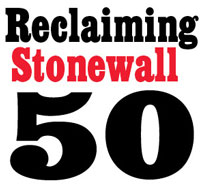 I am a two-spirit Native trans woman of Mohawk descent. I chair the department of secondary education at a tribal college in Montana and work successfully with local school districts, where I focus on creating educational opportunities for children that do not ask them to check their identities at the classroom door. But it’s been a long journey to get here.
I am a two-spirit Native trans woman of Mohawk descent. I chair the department of secondary education at a tribal college in Montana and work successfully with local school districts, where I focus on creating educational opportunities for children that do not ask them to check their identities at the classroom door. But it’s been a long journey to get here.
I grew up in the West, where people like me, tranny Native Americans, were ridiculed, scorned, or hidden. Although a part of me knew better than to see myself through the homophobic, lethally binary perspectives of rural Christians in 1960s America, another part remained closeted, even to myself, recognizing their broken reflections within me.
I first made a pilgrimage to the Stonewall Inn in 1984, when I was 24 and interning at the education department of the Bronx Zoo. Visiting the site of the Stonewall rebellion felt like a wild and illicit thing to do, like coming home to a place of which I had little foreknowledge. I remember standing at the door, imagining myself stepping into a new world, one that could embrace my questioning self. This was my first journey into queer space, and it was a heady experience. I danced the night away and took a big step forward.
Stonewall marked for me, as well as for the culture, the turning point from that early, dangerous, homophobic, binary place toward a culture of fluidity, strength, and wholeness. I came home to myself as I shifted genders over the next few decades, making the final change as I moved to North Dakota to teach in 2007. While there were a few scary moments, as well as a few funny ones, for the most part, I found acceptance—if not always approval—in this rural heartland, something not possible pre-Stonewall.
My tranny spirit has always known that my ancestors loved me, respected me, and prayed for me. It has been important balm for me and many of my sisters, Native and non-Native, to know that traditionally, most indigenous communities embraced and honored their gender-fluid relatives. “Two-spirit” is a modern term used by Native people that locates gender fluidity in a spiritual and cultural context. Although it varied by tribe and people, two-spirit folk were respected and inhabited spiritual roles in the community; all of us on the gender continuum were welcome and needed. That changed with colonization but is beginning to heal.
As a teacher, I see that all our children need support, that they deserve not to be filled with shame and self-doubt from their family or community, as so often happens to our rainbow youth. My indigenous grandmothers whisper in my ear, telling me to survive. They whisper I have a job to do, both to build bridges between Western science and indigenous understanding and to offer a positive reflection for gender-fluid children, their teachers, and their families. Community needs all children to be loved, whole, and ready to help their people thrive.
I know what it is like to feel targeted and unsafe. But over the last 10 years, so much has happened, so much precious change that we fought for and do not want to see backslide—hearts being honored, marriage freed from the gender binary, people comfortably gender-undefined, children able to choose the bathrooms where they feel most at home. Once the change began, it happened fast. Now this two-spirit married lesbian walks through halls of schools in the rural West, proud of who she is. I may surprise a few people, but now they focus more on the strength of my handshake and the integrity of my work. Some children may see a healthy and competent reflection of their inner truth for the first time.
I will be in New York for Pride this year, to remember and honor Marsha P. Johnson and Sylvia Rivera. Stonewall marks a turning point in our journey. It reminds us of the preciousness of our progress and the work that remains to be done.


